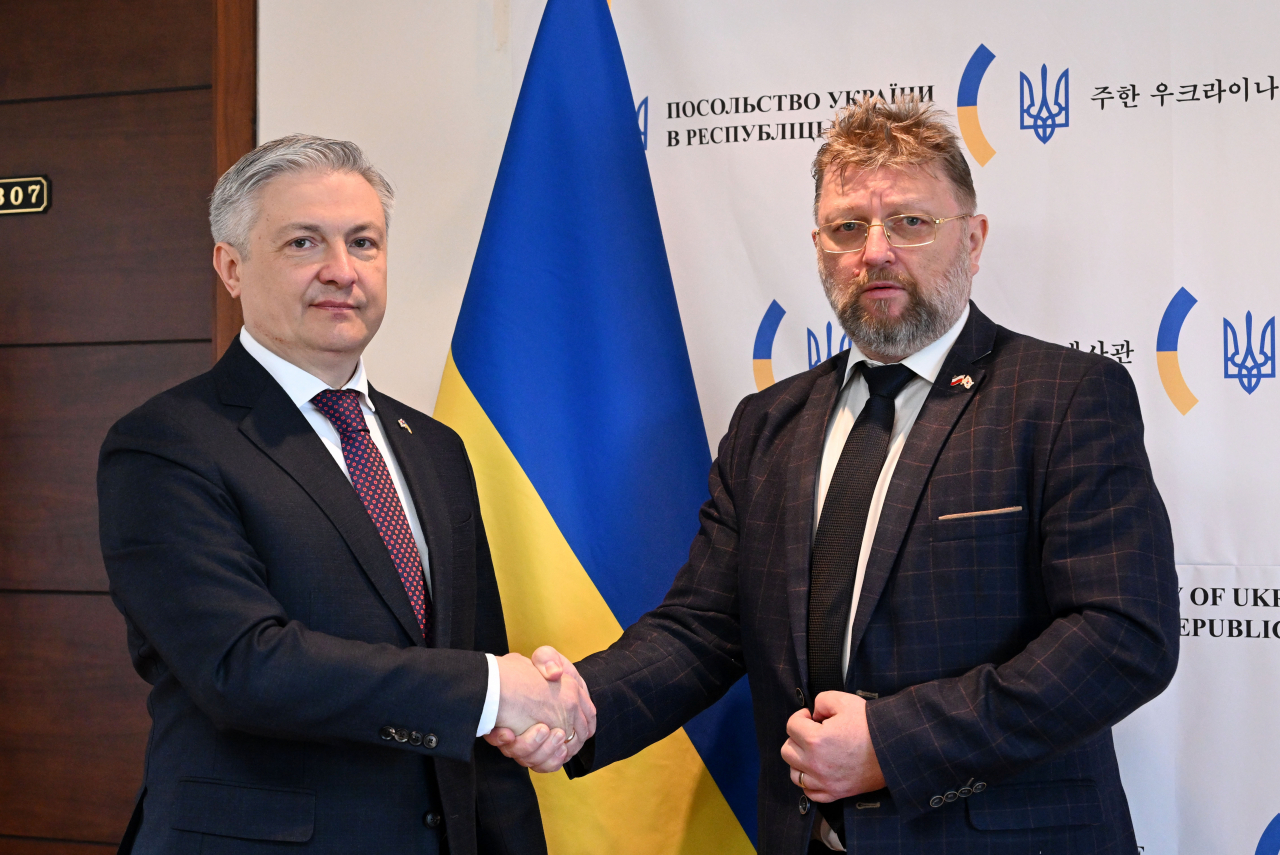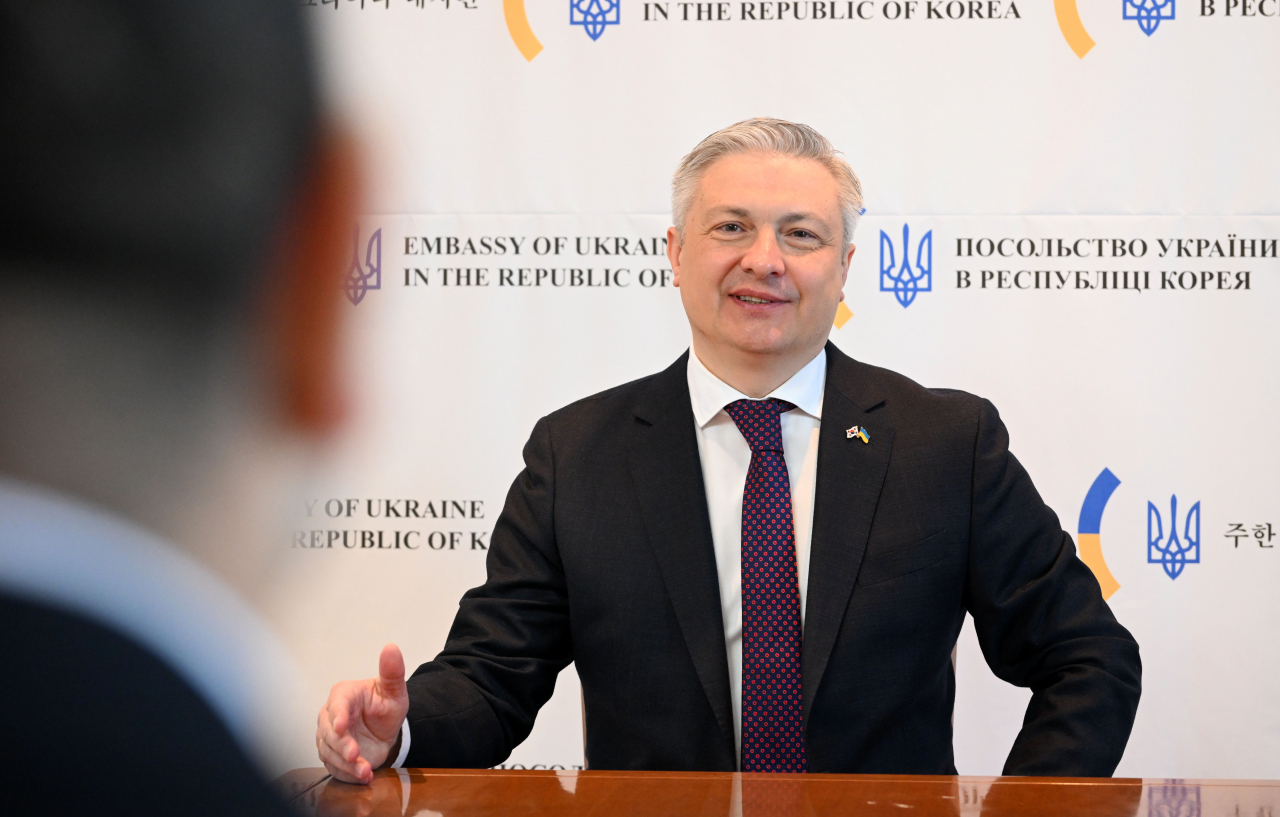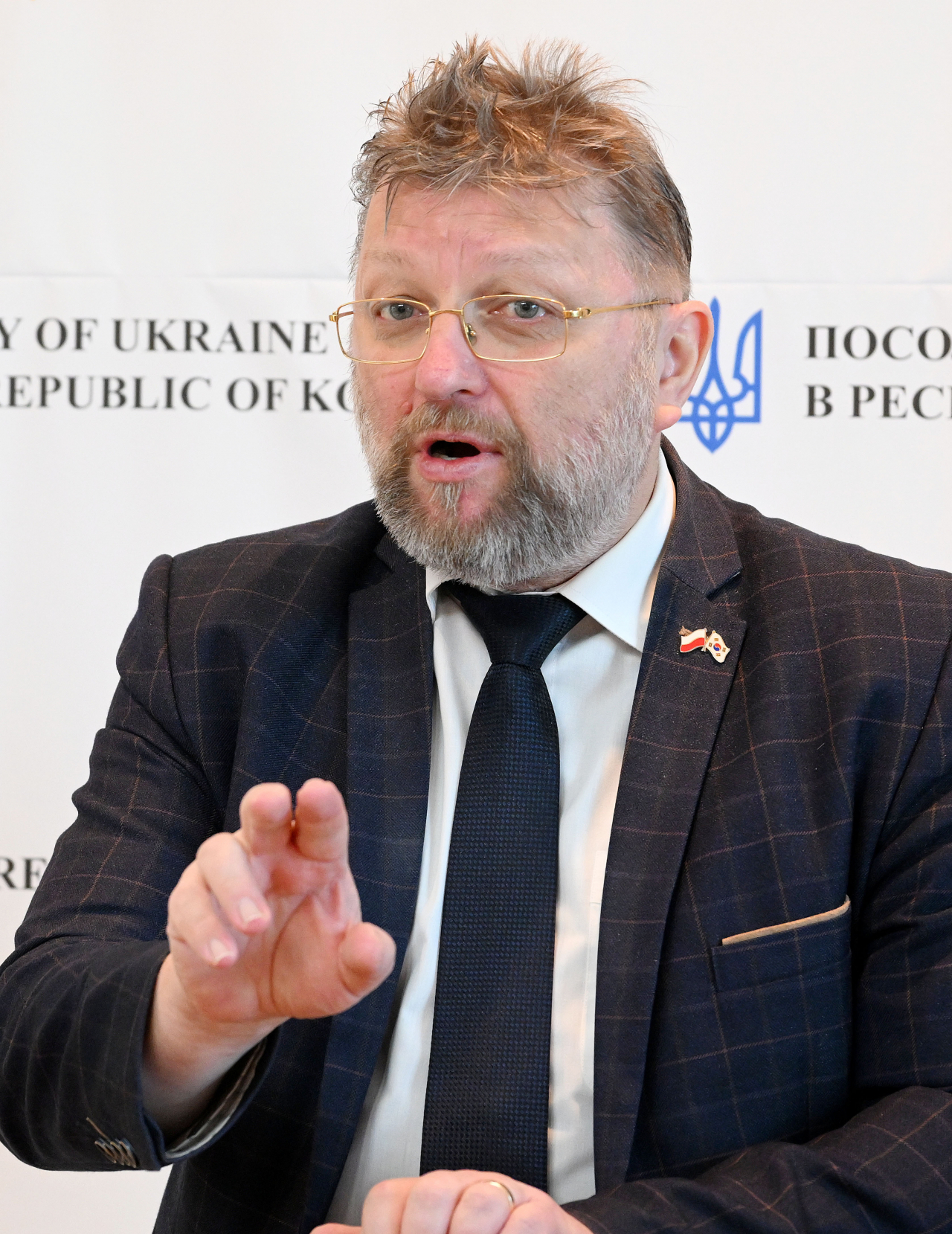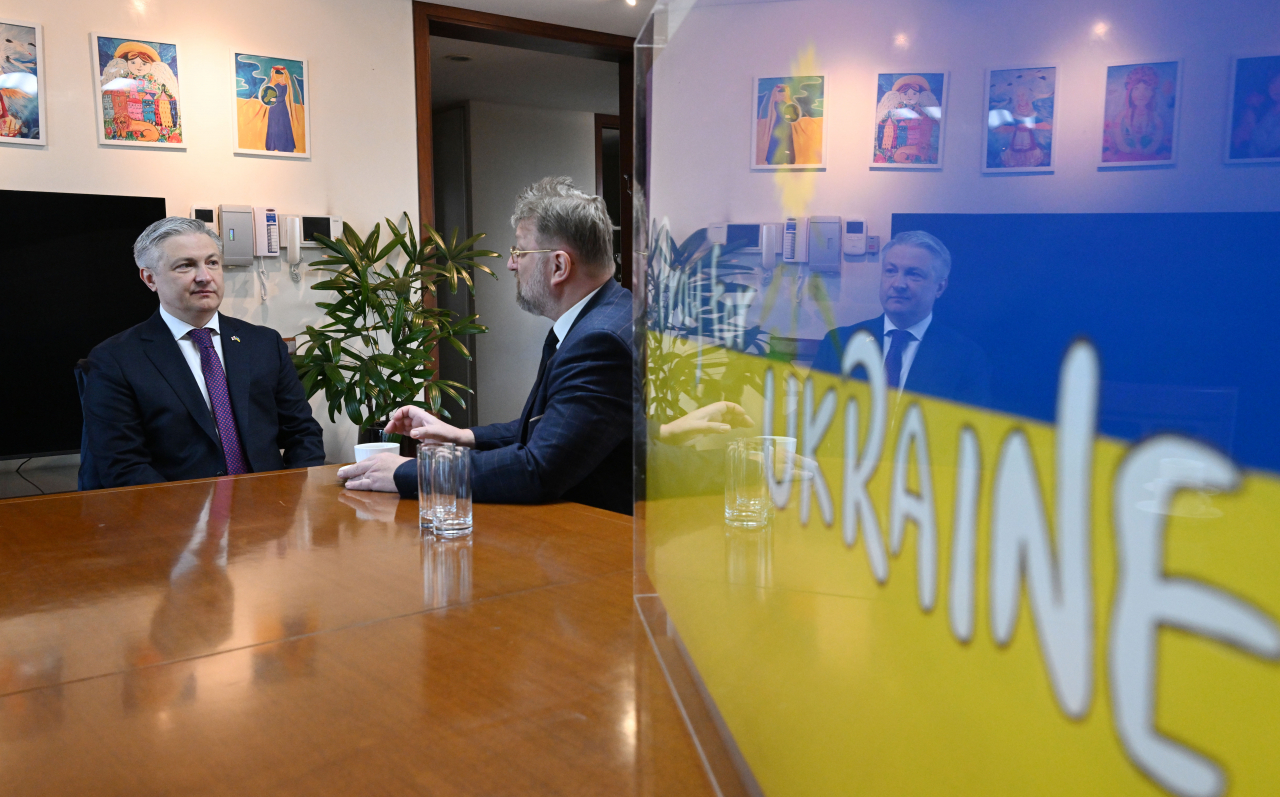
The Russian war against Ukraine will reach a critical juncture in spring or early summer, and there is anticipation that the war will end within the year. But even if subsequent peace talks take place, Russian leader Vladimir Putin will be the last person that Ukraine would want to talk to, Ukraine’s top envoy to Seoul said in an interview with The Korea Herald.
"I think the spring and early summer of 2023 will be decisive for the course of war. It is possible to win the war this year,” said the Ukrainian ambassador to South Korea, Dmytro Ponomarenko, with confidence, citing the will of the Ukrainian armed forces to liberate Ukrainian territory, as well as international support backing the endeavor.
According to Ponomarenko, Ukraine is facing down Russia’s last-ditch attempt to gather resources and mount a massive attack to prevent the Ukrainian Army's counteroffensive.
If Moscow is not defeated, Putin will continuously fortify Russia's military machine, posing a more formidable military threat to its neighbors and the entire European Union in the coming years, the ambassador warned.
"Under such circumstances, is there a room for dialogue? … How do you negotiate with a murderer who came to your house to kill you?” he questioned. “No ‘new territorial realities,' as claimed by Moscow, will be accepted.”
However, any negotiation might be considered only if Russia agrees to fulfill the conditions of Ukrainian President Volodymyr Zelenskyy, Ponomarenko said, calling Putin "a full-fledged war criminal" and "a liar."
Zelenskyy has outlined the five conditions for peace talks with Russia: restoration of Ukraine's territorial integrity, respect of the UN Charter, compensation for all damages caused by Russia, punishment of war criminals and solid guarantees that such an assault would never happen again.
International efforts to end the war have been amplifying, he said, citing Ukraine's partners who have been reaching agreements on providing new weapons.

A tank coalition of 12 countries will allow Ukraine to conduct mechanized warfare, defeat the Russian military and liberate Ukrainian territory, according to Ponomarenko, who applauded Poland, the US, the UK, Germany and France for their support.
"Ukraine and its partners must not allow the resistance to slow down. "Long-range missiles and fighter jets must follow to bring the victory closer," he said. "Ukraine’s victory is critical to European and global security."
On Zelenskyy's speculation raised at the World Economic Forum in Davos, Switzerland last month that he was not "entirely sure" that Putin is still alive, the ambassador thinks that the president might have been alluding to the long tradition of the Russian regime deceiving people.
"As you might know, the Moscow regime have often been suspected of using the lookalikes of its leader for performing some official public functions in his stead for whatever reasons," he said, alluding to security and health issues, among others. "There is a chance that a man you see on TV screen might not actually be Putin himself."
"But what President Zelenskyy really meant I think was that Putin’s ability to tell the truth or keep his word has been totally discredited. He and Russian officials have told blatant lies too many times. In addition to that, the Russian leader is now a full-fledged war criminal. So, if the Government of Ukraine negotiates with Russians at some point in the future, it will definitely not be with him."
Joining forces with the Ukrainian ambassador, Polish Ambassador to Korea Piotr Ostaszewski urged the Kremlin to withdraw the Russian military from Ukraine, addressing grave concerns over the devastating human suffering.
Russia has destroyed 49,000 buildings, 3,000 schools, 330 hospitals and 595 public administration buildings, according to the Polish ambassador. Approximately 18,000 civilians have been killed, including over 500 children, he added.
"What should be emphasized is that there are a lot of children -- and we don't know how many of them -- who were kidnapped," said Ostaszewski.
This 21st-century war seems to be as brutal and unrelenting as the 1950-53 Korean War, he said. "How well known it is for Koreans that, from the time of the Korean War, many children were taken to North Korea once this part of the country was invaded?”
According to Ponomarenko, millions of hectares of protected area have been impacted by shelling and war-related pollution, and much of Ukraine’s agricultural land, which contains a quarter of the world’s most fertile black "chernozem" soil, has been littered with mines and unexploded ordinances during the fighting.
Ponomarenko said the estimated cost of replacing Ukraine's damaged infrastructure extended to approximately $140 billion by the end of 2022.
Poland’s role
In the joint interview, the Polish ambassador stressed that the country stands in unity to end the war and that its efforts had been signified during US President Joe Biden’s surprise visit to Ukraine and Poland.

"It shows what role Poland (should) play in defending Ukrainian freedom and sovereignty. Poland's role on both the eastern flank and in international relations is critical," Ostaszewski noted.
Poland’s international conceptual efforts have started on Ukraine’s postwar reconstruction process. Poland actively participated in EU and member state actions to convey the message about Russian aggression against Ukraine and its consequences for countries in the Global South.
More than 1.5 million Ukrainian refugees have been offered refugee status, and Poland facilitated the transfer of international aid through the Polish border to Ukraine as an international transport hub, according to Ostaszewski.
Poland allocated 8.36 billion euros ($8.88 billion), or about 1.5 percent of the Polish gross domestic product, for humanitarian aid to Ukrainian refugees, with an average cost of 5,200 euros per capita. Ostaszewski also touted Polish military aid to Ukraine for arms and ammunition, which has exceeded 3 billion euros.
"We are all united like never before, and Poland is the leader of the support for Ukraine," underlined Ostaszewski, adding that Poland would continue its material, humanitarian and sorely needed moral support to Ukraine.
Ostaszewski extended his staunch solidarity with Ukraine, saying that Ukraine is supported by the free community.
"Ukraine defends itself, it defends Europe and it defends the whole community; it shows how a heroic nation can fight for its existence -- it is a war for national existence," Ostaszewski said.

Yoon-Zelenskyy dialogue
While thanking South Korea for its support offered to Ukraine, the Ukrainian ambassador said a meeting between the leaders of the two countries would be very important.
"Ukraine received $100 million in aid from Korea in 2022. We are deeply grateful to the people of Korea for their warm-hearted responses to Ukraine’s tragedy, donations and the messages of hope and support," said Ponomarenko, extending his gratitude to the Korean government for offering humanitarian aid such as medical supplies, ambulances, pickup trucks, excavators and power generators.
"Substantive dialogue at the highest level between President Yoon Seok Yeol and President Zelenskyy is very important now.”
The two leaders have never met in person, having only talked to each other in a phone call nearly a year ago on March 29, 2022, after Yoon won election and was transitioning into the presidency. The Ukrainian leader extended an invitation to Yoon through Lee Jun-suk, then leader of the ruling People Power Party, who visited the country in June last year. But the South Korean leader has not yet responded to the invitation amid growing calls from the US-led alliance for support from the world’s eighth-largest arms exporter.
But for the South Korean leader, who already faces myriad diplomatic challenges and imminent threats from North Korea, it is still a difficult prospect to offer military aid to Ukraine, according to experts in Seoul.
The Polish ambassador, meanwhile, said the decisions are up to the Korean government, when asked whether he thinks the country must extend military support to Ukraine.
"I think that Korean government is aware how serious is the situation since it even mentioned in the Indo-Pacific Strategy that Russian aggression against Ukraine is the serious abuse of international law."
This is the third installment of a series of articles and interviews on Russia's invasion of Ukraine marking one year on Feb. 24, to shed light on the brutality of the war and its complex impact on the international community and South Korea. -- Ed.





